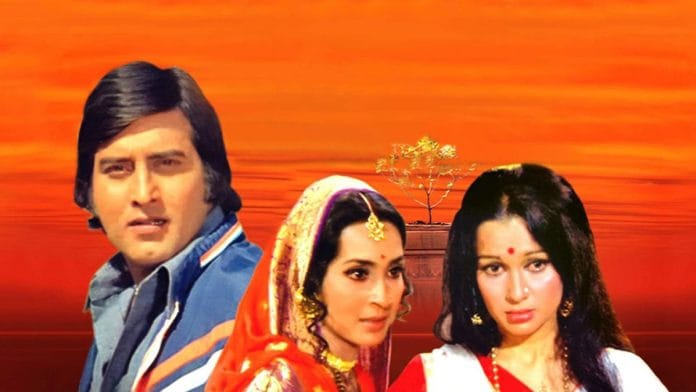The Other Woman has always been a figure of intrigue and endless fascination in Bollywood. Contemporary films like Gehraiyaan and Life in a Metro explore this archetype with a little more nuance, but yesteryear Hindi movies knew no middle ground. She was either the evil destroyer of families or the self-sacrificing woman. In both cases, the husband’s actions were irrelevant—he was a victim of her wiles
Main Tulsi Tere Aangan Ki (1978), based on Chandrakant Kakodkar’s Marathi novel Ashi Tujhi Preet glorifies the all-sacrificing Other Woman. Here, too, the husband’s role is negligible. He is not held accountable for his actions. What sets this movie apart from others of its ilk is the powerful performances by the two female actors, Nutan and Asha Parekh. They carry the movie to its predictable end.
Nutan won a Filmfare Award for Best Actress for her role as the wife, Sanjukta Chouhan, whose husband Rajnath Singh Chouhan (Vijay Anand) is in love with Tulsi (Parekh). In typical Bollywood melodrama fashion, Tulsi gives birth to their son Ajay and then sacrifices drinks poison for the sake of her lover’s family. How Sanjukta eventually accepts Ajay as her own and the relationship between him and her own son forms the rest of the plot.
Sanjukta is shown as a righteous woman who has to live with a man who would rather sleep with his lover. No one admonishes the man for the lack of a backbone. Rather, Rajnath’s mother (Purnima Das Verma) cautions Sanjukta against ‘letting’ her husband go to his lover.
There’s the mandatory confrontation scene as well when the two women face off against each other.
“You [Tulsi] are like alcohol. Men who drink it forget their families and I am like gangajaal, but I do have intoxication,” says Sanjukta. This trope of pitting one woman against another is still popular, not just in Hindi movies, but in Hollywood as well. In the 2008 movie, The Women, the showdown between Meg Ryan’s character Mary and the other woman Crystal (Eva Mendes) takes place in a lingerie store. It doesn’t get more banal than that.
Also read: Rekha’s Ghar asks an important question—How does a couple survive sexual assault?
A prominent trope
The other woman featured prominently in a roster of Hindi movies. She propelled the plot for another hit film Souten (1983). Shyam Mohit (Rajesh Khanna), and Rukmini (Tina Munim) are married, and Radha (Padmini Kolhapure) is the other woman. In this film too, the resolution of the alleged affair takes place after Radha kills herself.
The 1978 film, Pati Patni Aur Woh—and its 2019 Bollywood remake starring Bhumi Pednekar and Ananya Pandey—attempted to turn this otherwise fraught situation into a comedy. The other woman here is more clueless than conniving, and the premise in both is based on the acceptance that women can easily be fooled. Gulzar’s Ijazaat (1987), is one of the few movies that handles this trope with sensitivity—the wife refuses to stay in a marriage with the looming presence of another woman.
Main Tulsi Tere Aangan Ki, directed by Raj Khosla was a hit, but Asha Parekh’s role never quite left her. Many women wrote letters to her wanting to know if she would be okay being a real-life Tulsi. Parekh replied that she would never become someone’s co-wife.
What’s interesting is that the movie also explores the dynamics between Tulsi’s son Ajay and Sanjukta’s son Pratap. By this time, the husband is conveniently dead. Though Ajay is sent to a boarding school, he returns home to Sanjukta. What follows are his clashes with her son.
Also read: ‘Insaf Ka Tarazu’ was well-intentioned but couldn’t resist rape fetishisation of ’80s Bollywood
An ideal wife?
Main Tulsi Tere Aangan Ki emphasises the qualities that make an ideal wife, sacrifice at the top of the list, and the ability to forgive her husband for anything and everything.
Khosla does not tone down the melodrama at all. Tears are a constant in the film. It does not matter why, but some character, preferably a woman, needs to be crying. Coupled with hyperbolic dialogues, and young romance, the film was a box office success. It also won the Filmfare Awards for the Best Film and Dialogue, written by Rahi Masoom Raza.
The film’s music by Laxmikant-Pyarelal was the perfect accompaniment to the heightened emotions, especially in the first half of the film. Songs like Chhap Tilak Sab Chhini Re by Lata Mangeshkar and Asha Bhosle, Yeh Khidki Jo Band Rahti Hai by Mohammed Rafi and Saiyan Rooth Gaye by Shobha Gurtu were especially popular.
Nutan’s performance as the woman who not only endures her husband’s infidelity, and eventual death but also chooses to bring up his illegitimate son stands out.
“I was a big fan of Nutanji. Very scared to face the camera with her. She has such a powerful presence. But she never let me feel the weight of her presence. She was so gentle, so soft,” said Parekh in an interview.
(Edited by Theres Sudeep)







Journalists who require psychological or psychiatric counselling should not be using The Print for their therapy sessions. The list is quite long and includes Ms. Ratan Priya and Ms. Triya Gulati as well.
The Print should not turn itself into an outlet for therapy sessions.